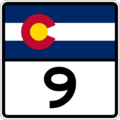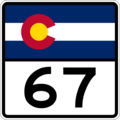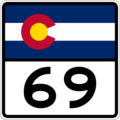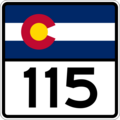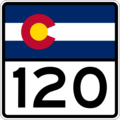Fremont County, Colorado facts for kids
Quick facts for kids
Fremont County
|
||
|---|---|---|
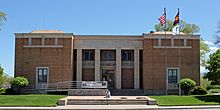
|
||
|
||
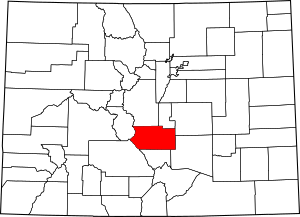
Location within the U.S. state of Colorado
|
||
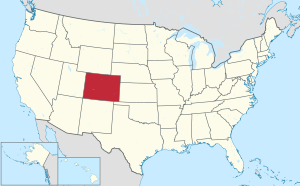 Colorado's location within the U.S. |
||
| Country | ||
| State | ||
| Founded | November 1, 1861 | |
| Named for | John C. Frémont | |
| Seat | Cañon City | |
| Largest city | Cañon City | |
| Area | ||
| • Total | 1,534 sq mi (3,970 km2) | |
| • Land | 1,533 sq mi (3,970 km2) | |
| • Water | 0.9 sq mi (2 km2) 0.06%% | |
| Population
(2020)
|
||
| • Total | 48,939 | |
| • Density | 32/sq mi (12/km2) | |
| Time zone | UTC−7 (Mountain) | |
| • Summer (DST) | UTC−6 (MDT) | |
| Congressional district | 7th | |
Fremont County is a county in the state of Colorado, USA. In 2020, about 48,939 people lived here. The main city and county seat is Cañon City.
The county is named after John C. Frémont. He was an explorer and even ran for president in the 1800s. Fremont County is part of a larger area that includes Pueblo.
This rural county is home to many correctional facilities. These are places where people who have committed crimes are held. One of these is ADX Florence, a federal prison.
Contents
History of Fremont County
Fremont County was created in 1861. It is located in the central part of Colorado. As mentioned, it was named after the famous explorer John C. Frémont.
Geography of Fremont County
Fremont County covers a total area of about 1,534 square miles. Most of this area is land. Only a very small part, about 0.9 square miles, is water.
Neighboring Counties
Fremont County shares borders with several other counties:
- Teller County to the north
- El Paso County to the northeast
- Pueblo County to the southeast
- Custer County to the south
- Saguache County to the southwest
- Chaffee County to the northwest
- Park County to the northwest
Main Roads and Highways
Several important roads pass through Fremont County:
 U.S. Highway 50
U.S. Highway 50 State Highway 9
State Highway 9 State Highway 67
State Highway 67 State Highway 69
State Highway 69 State Highway 115
State Highway 115 State Highway 120
State Highway 120
Protected Natural Areas
Fremont County has parts of national forests and wilderness areas:
- Pike National Forest
- San Isabel National Forest
- Sangre de Cristo Wilderness
State Parks and Recreation Areas
- Arkansas Headwaters Recreation Area
Scenic Routes and Trails
You can find special routes for driving and biking here:
- Gold Belt Tour National Scenic and Historic Byway (a scenic drive)
- American Discovery Trail (a long hiking and biking trail)
- TransAmerica Trail Bicycle Route
- Western Express Bicycle Route
Population of Fremont County
| Historical population | |||
|---|---|---|---|
| Census | Pop. | %± | |
| 1870 | 1,064 | — | |
| 1880 | 4,735 | 345.0% | |
| 1890 | 9,156 | 93.4% | |
| 1900 | 15,636 | 70.8% | |
| 1910 | 18,181 | 16.3% | |
| 1920 | 17,883 | −1.6% | |
| 1930 | 18,896 | 5.7% | |
| 1940 | 19,742 | 4.5% | |
| 1950 | 18,366 | −7.0% | |
| 1960 | 20,196 | 10.0% | |
| 1970 | 21,942 | 8.6% | |
| 1980 | 28,676 | 30.7% | |
| 1990 | 32,273 | 12.5% | |
| 2000 | 46,145 | 43.0% | |
| 2010 | 46,824 | 1.5% | |
| 2020 | 48,939 | 4.5% | |
| 2023 (est.) | 50,318 | 7.5% | |
| U.S. Decennial Census 1790-1960 1900-1990 1990-2000 2010-2020 |
|||
The population of Fremont County has grown a lot over the years. In 1870, there were just over 1,000 people. By 2020, the population had grown to almost 49,000.
In 2000, the average household had about 2.43 people. The median age was 39 years old.
Sister Cities
Fremont County has special connections with cities in other places:
 Kahoku, Yamagata Prefecture, Japan
Kahoku, Yamagata Prefecture, Japan Valday, Russia
Valday, Russia Skippack, Pennsylvania, United States
Skippack, Pennsylvania, United States
Correctional Facilities
Fremont County is known for having many correctional facilities. These are places where people who have broken laws are held.
The Colorado Department of Corrections runs several prisons here. These include the Colorado Territorial Correctional Facility in Cañon City. Other state prisons are also located nearby.
The Federal Bureau of Prisons also operates a large complex called the Federal Correctional Complex, Florence. This complex includes ADX Florence, which is a very high-security federal prison.
Communities in Fremont County
Fremont County has several cities, towns, and smaller communities.
Cities
- Cañon City (This is the county seat)
- Florence
Towns
Census-Designated Places
These are areas that are like towns but are not officially incorporated:
Other Communities
These are smaller, unincorporated communities:
Ghost Towns
Some places in Fremont County used to be towns but are now abandoned:
Images for kids
See also
 In Spanish: Condado de Fremont (Colorado) para niños
In Spanish: Condado de Fremont (Colorado) para niños
 | Sharif Bey |
 | Hale Woodruff |
 | Richmond Barthé |
 | Purvis Young |




